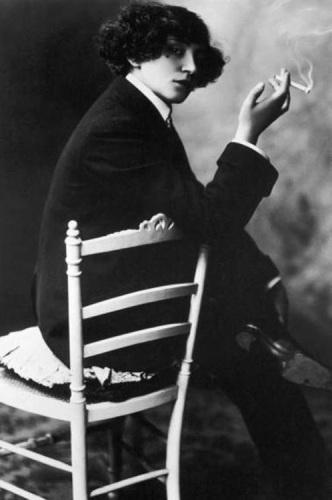Urgh, February. Here in London it’s the fag end (I’m not sorry) of Winter, and about as grimy, gray and dispiriting as this city gets. I don’t want a book to try to lift my spirits, or tempt me with things, like sunshine and first love, that I can’t have – I want something witty and spiteful and perversely contemptuous of its reader. And when I’m in that kind of mood I turn to Colette.

Aggravating, entrancing, despicable, inspiring Colette – if it sounds like I have a crush it’s because I do, and have done for the past fourteen years. And, in this kind of mood, I don’t want the sauciness of her Claudine novels, or the wistfulness of The Vagabond or Cheri, but the worn-out, cynical, bittersweet loveliness that is The Pure and The Impure.
A series of short, roughly autobiographical chapters, detailing all of the most ridiculous things we do in love and in lust, reading it feels like listening to the kind of old friend you love and hate in equal measure. Deliberately contradictory and provocative, the ambivalence Colette displays towards trans people and queer relationships has put off a fair few readers – ignoring the essential points that Colette herself was queer, that aspects of her life and character could well be described as trans – and that that ambivalence is turned on every aspect of life that she encounters, herself most of all. Cross-dressing aristocrats, effeminate boys, self-destructive lesbians – it sounds more salacious than it is, and is far more tender than a surface reading allows.
‘The seduction emanating from a person of uncertain or dissimulated sex is powerful. Those who have never experienced it liken it to the banal attraction of the love that evicts the male element. This is a gross misconception. Anxious and veiled, never exposed to the light of day, the androgynous creature wander, wonders, and implores in a whisper…Its half equal, man, is soon scared and flees. There remains its half equal, a woman. There especially remains for the androgynous creature the right, even the obligation, never to be happy. If jovial, the androgynous creature is a monster. But it trails irrevocably among us its seraphic suffering, its glimmering tears. It goes from a tender inclination to maternal adoption…As I write this, I am thinking of La Chevalière. It was she who most often bruised herself in a collision with a woman – a woman, that whispering guide, presumptuous, strangely explicit, who took her by the hand and said, “Come, I will help you find yourself…”
“I am neither that nor anything else, alas,” said La Chevalière, dropping the vicious little hand. “What I lack cannot be found by searching for it.”‘
As always, her writing is exquisite.
Good for: Decadents, Francophiles, depressives and those wondering if the pain of love is worth it.
Bad for: Optimists, anyone who can’t bear to have the piss ripped out of them.
Goes with: The best French Roast you can find, sitting alone in a cafe in Soho and watching the evening go by.
Filed under: books/comics, trans

